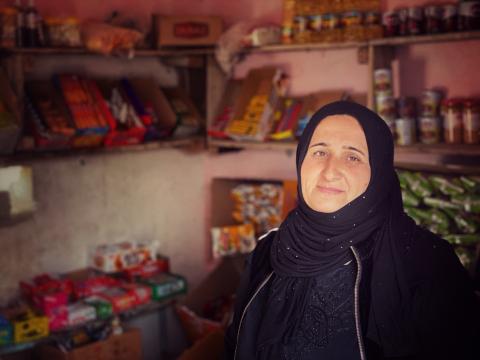Happiness finally comes

Fatma remembers the year she turned 13 – she had just passed her fifth-grade exams when her parents married her off. She had never seen her husband-to-be before she was told she was to marry him. No one ever asked her if she wanted to marry then. It was a decision made by her parents. She was married off in twenty days and left school for good.
Fatma recalls, laughing, “They didn’t ask for my opinion (on marrying me off). So today, I say to them, God bless you, but I swear to God you were unfair to me.”
Originally from the east side of Mosul, when she married, she moved to the western more historical side of Mosul. She lived there for twenty-eight years until her husband was killed during the conflict.
Today, Fatma, forty-nine years of age, is widowed and has four children, the youngest is seven, and the eldest is twenty-six. Her youngest child was only three months old when his father died. Her husband was a daily labourer. He was not a rich man, but he was good to Fatma and their children, and somehow, they made ends meet.
When the conflict started in Mosul, they thought it was a temporary conflict and would end soon, but it proved different as days went by. Fatma’s family attempted to leave Mosul, walking to Til-Kaif, 85 km away from Mosul. The idea was to get a ride to the Kurdistan Region of Iraq, but the drivers asked them for 100,000 IQD (USD 70) to transport them. They didn’t have the money, so they returned back to Mosul. They lived for three years in the conflict.
One day during the conflict, life totally collapsed for Fatma and her family. She recalls bitterly, “It was around mid-day, and we were having lunch in the yard of our home. During that time, the planes were attacking. One of the ISIL members’ GPS motors were standing by our home. We couldn’t talk to them to move it away (none of us dared). Suddenly we didn’t feel anything, and the house just collapsed. We found my daughter under the wreck of the house and my husband under the yard gate. We thought the girl had died, and my husband died after a few hours. I took my daughter on the carriage to the hospital, and she underwent surgery. She was in a coma for forty days. She was only three years old then.”
She remembers the Ramadan period right after the explosion before the conflict ended. Her whole family was fasting. They only had one meal a day to break their fast – and it was not anything special – they had to break their fast modestly with water and wheat.
After the conflict ended, she moved to Til-Kaif, 85 km away from her now destroyed home. Her parents and other family members lived there. She had no steady income as a widow, so organisations, mosques, and charitable people aided her for years. She also got food rations from the government. Fatma miserably recalls those days “It was challenging. The feast (for the holidays) would come, and I couldn’t buy them (the children) clothes. Then, when the winter came, I couldn’t buy them clothes. If they (charitable people) brought us clothes, we would wear (them); if not, we wouldn’t. So we were living on one meal a day.”
A few months ago, Fatma was selected to participate in a Sustainable Livelihoods and Economic Recovery Project that World Vision Iraq implements in partnership with UNDP Iraq with funding from BMZ and KFW. Through the project, she got business training and a financial grant. In addition, she learned how to deal with wholesale buying. With her new knowledge and the grant money, Fatma opened a store where she sells snacks, food and beverages. Her store is near several schools and residential houses, enabling her to attract many customers. Today she is part of a savings group; she saves between IQD 5,000 to 15,000 (USD 4-14) a week. She hopes to save enough to further expand her business and buy more items in the future.
She shares how her life has transformed. “Now, with this project, my circumstances are better. Before, my younger child wanted fruits, but I couldn’t buy them for him. Before they (the children) would see other children’s things, they would cry and want the same. So I would tell them your father will come and bring for you.”
When Fatma first opened her store, she would get only twenty customers. Today, as she has increased her stock and added other items for sale, her pool of customers has also increased. She estimates that she has fifty to sixty customers a day.
She shares, “Before, we wouldn’t eat meat. Maybe during the feast, I would buy some meat and fruits. Maybe. We didn’t have bananas for five years. I am finally making enough (money), so I bought some. Thanks to God. This year I also bought the children clothes.”
Fatma continued, “I was married for twenty-eight years and five to six years widowed with my children, but the happiest moment of my life is now. I am living better now than at any other time in the past. I am meeting my children’s needs. It is the most difficult thing when your children ask you for something, and you can’t do it for them. At those moments, I would wish to die.”
Fatma feels proud of all that she has done in her life and the obstacles she has overcome; Fatma teared as she uttered the words, “I live with a strong will and dignity.”